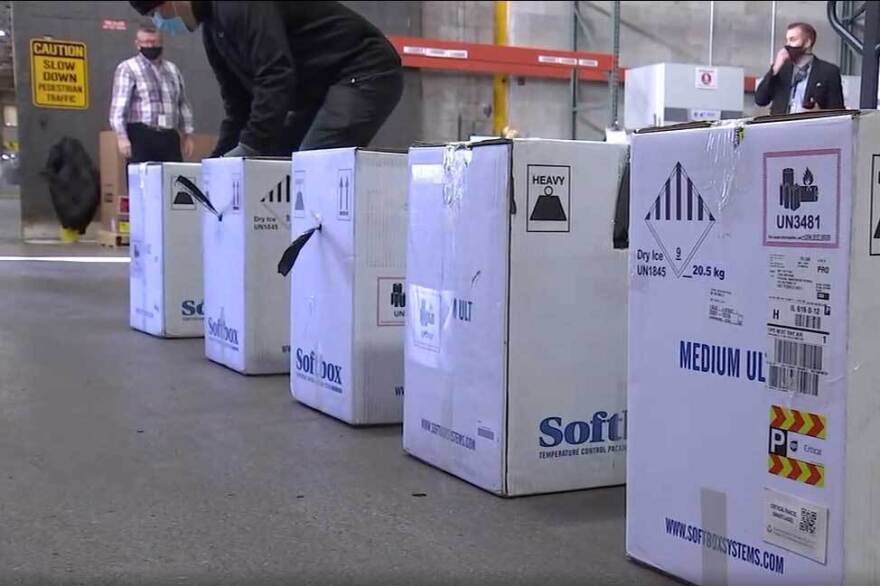When Gov. JB Pritzker observes COVID-19 vaccines administered at a Peoria hospital on Tuesday morning, he’ll be witnessing among the first COVID-19 inoculations in Illinois after the state received its first shipment of the COVID-19 vaccine made by Pfizer-BioNTech.
The state received 48,000 doses of the vaccine on Monday — about half what the state is expecting this week.
Pritzker on Monday said the vaccines’ arrival marked “the beginning of the end of the pandemic,” though it will be many months before all Illinoisans who want a COVID-19 vaccine are able to get one.
The initial shipments from the federal government arrived at the Illinois National Strategic Stockpile in Chicago Monday morning.
From there, vaccine allotments will be shipped to ten hospitals across the state designated as Regional Hospital Coordination Centers , which will serve as pickup locations for local health departments to begin distribution to area healthcare workers.
Three of those hospitals — OSF St. Francis Medical Center in Peoria, St. John’s Hospital in Springfield and Carle Foundation Hospital in Urbana — serve Central Illinois. How many each regional hub will receive is still unclear, according to hospital officials.
But those hospitals are not keeping all of those vaccine doses for their own staff.
Prioritizing a limited first shipment
Illinois is prioritizing 50 counties with the highest COVID-19 death rates for the initial vaccine distribution. Gov. J.B. Pritzker’s office released the list of high-priority counties earlier this month, but several days later acknowledged that not all of the identified counties had hospitals.
To correct for that, some of the smaller counties are voluntarily giving up some of their vaccine allotments to other counties with hospitals treating COVID-19 patients. Illinois Department of Public Health Director Ngozi Ezike last week acknowledged the agency had to backtrack on its initial vaccine distribution plans.
Pritzker said the major hospitals treating very ill COVID patients should be prioritized.
“If you want to save lives in a county that’s being served by a hospital that doesn’t happen to be in that county, then it makes sense for vaccines to be provided at the regional hub,” Pritzker said last week.
Each local health department will determine how many doses will go to healthcare workers in their county. Residents and staff of long-term care facilities will also be included in the initial rounds of vaccine distribution, through a federal program involving CVS and Walgreens.
How hospitals are preparing
Sandy Salverson is vice president of pharmacy operations for OSF HealthCare in Peoria, which operates more than a dozen hospitals across the state. She is unsure how many doses OSF will receive for its staff, as those numbers are “still being confirmed.”
But she said one thing’s for sure: The initial shipment will not be enough to vaccinate the entire staff of any individual hospital. So OSF and other hospitals must determine who will be first in line.
Salverson said hospital employees who have direct or indirect exposure to COVID-19 patients are at the top of the list, including doctors and nurses, as well as staff that clean hospital rooms and handle waste.
“We're following what the guidelines are from the CDC and IDPH, in terms of that guidance,” Salverson said.
HSHS St. John’s hospital in Springfield, a regional distributor for more than a dozen counties in west-central Illinois, is also expecting a shipment of vaccines. E.J. Kuiper, president of HSHS Illinois, said the state is still finalizing how many the hospital will receive for its region.

“We have an operational plan in place to immediately start vaccinating people, not only in our hospital, but in the counties that we support,” said Kuiper.
HSHS St. John’s received a specialized freezer from the Illinois Emergency Management Agency that can hold up to 150,000 doses of the Pfizer vaccine, which requires storage at minus 70 degrees Celsius.
OSF’s Salverson said the hospital expects to receive the doses at a refrigerated temperature, which gives them a limited amount of time — about four days — to get them into people’s arms.
To prepare, the hospital system has been doing dry-runs of vaccine administration and are making sure they know who among their high-priority staff want to get the vaccine so that none of the doses go to waste.
“Our objective is to make sure we’re good stewards of the resource and make sure we can get as many of our mission partners protected as we can,” Salverson said.
OSF’s hospitals include locations in Champaign, McLean and Peoria Counties, which are not on Illinois’ list of top-priority counties.
But Salverson said OSF’s Peoria hospital will receive vaccines for their workers from the first shipment because they serve a region that includes high-priority counties that do not have a hospital.
Bloomington-Normal must wait
Neither large hospital in Bloomington-Normal — in McLean County — will receive doses of the vaccine this week. Carle Physician Group-owned BroMenn Medical Center in Normal and OSF St. Joseph in Bloomington are not on the list for initial vaccine distribution, spokeswomen for the hospitals said Monday.
Bloomington-Normal is in the same longstanding EMS region as Peoria, whose OSF St. Francis hospital is a Regional Hospital Coordinating Center. Carle Foundation Hospital in Urbana will receive initial doses, according to Carle spokeswoman Jamie Mullin. Though Carle also operates BroMenn, Carle is not sharing doses across its ownership, as that’s a decision left up to health officials.
Mullin said Carle had limited information, but currently is expecting to receive “a limited supply” of vaccine doses this week, with additional shipments expected in the weeks ahead.
“We will be rolling this out to our employees in a phased approach starting with first responders and those who care for COVID patients,” Mullin said.
While downstate Illinois’ first COVID-19 vaccine shots will be administered at Peoria’s OSF St. Francis on Tuesday morning, other OSF-owned hospitals in Illinois will not be receiving doses, according to OSF spokeswoman Libby Allison. That includes OSF St. Joseph in Bloomington, OSF St. Mary in Urbana, OSF HealthCare Sacred Heart Medical Center in Danville and OSF HealthCare Saint Luke Medical Center in Kewanee.
“We trust the process set by the state, and are looking forward to learning more about future shipments and distribution,” Allison said in an email.
Allison also could not share how many doses OSF’s Peoria hospital would be receiving, nor the number of employees the hospital would be able to vaccinate initially.
Some smaller hospitals ahead in line
Meanwhile, a spokesman for Springfield-based Memorial Health System said he expects 1,335 doses for four of the system’s five hospitals in central Illinois, but the number is subject to change by local health departments.
Both Decatur Memorial Hospital and Passavant Area Hospital in Jacksonville are expected to receive more doses -- 495 and 440 respectively -- than Memorial Medical Center in Springfield’s 350. This is despite having fewer beds and treating fewer COVID-19 patients, according to a dashboard of data published by Memorial .
The two smaller hospitals serve counties that have a higher death rate from COVID-19, where IDPH is prioritizing the first round of vaccine doses. For example, Passavant treats residents in Morgan, Cass and Greene counties, which are all among the 50 counties with the highest death rates from the virus.
Similarly, Taylorville Memorial in Christian County expects 50 doses, while Abraham Lincoln Memorial Hospital in Logan County is not set to get any doses. Christian County ranks 33rd among the 50 counties, while Logan is not on the list.
“We're very optimistic that with the volume of vaccine that's going to be available, in the end, it'll be kind of a moot point of who is on that very first list of the first allocation,” said Kim Bourne, president and CEO at Taylorville Memorial.
Christian County is also home to Pana Community Hospital, which expects between 50 and 60 doses. President and CEO Trina Casner said that is enough to inoculate all the staff in their COVID-19 unit, emergency department and a respiratory clinic that see people with COVID-19 symptoms.
She said she was a little surprised to see Pana on the list, but not disappointed.
Demand outpaces supply, for now
At a news conference Monday, Ezike said the state is working to facilitate vaccine distribution as fast as possible.
“We have been preparing for this day and praying for this day for months,” Ezike said. “And we’re working with our local health departments and hospitals to get the vaccine into the arms of those who need it most as quickly as possible.”
While drugmaker Pfizer is the only manufacturer whose vaccine has received FDA approval so far, another vaccine made by Moderna could be authorized this week.
Ezike said while this is an historic moment, it could take many months for the vast majority of residents to be vaccinated and for the vaccine supply to catch up with demand.
In the meantime, wearing a mask, physical distancing and frequent handwashing are still advised.
Sean Crawford contributed reporting.







